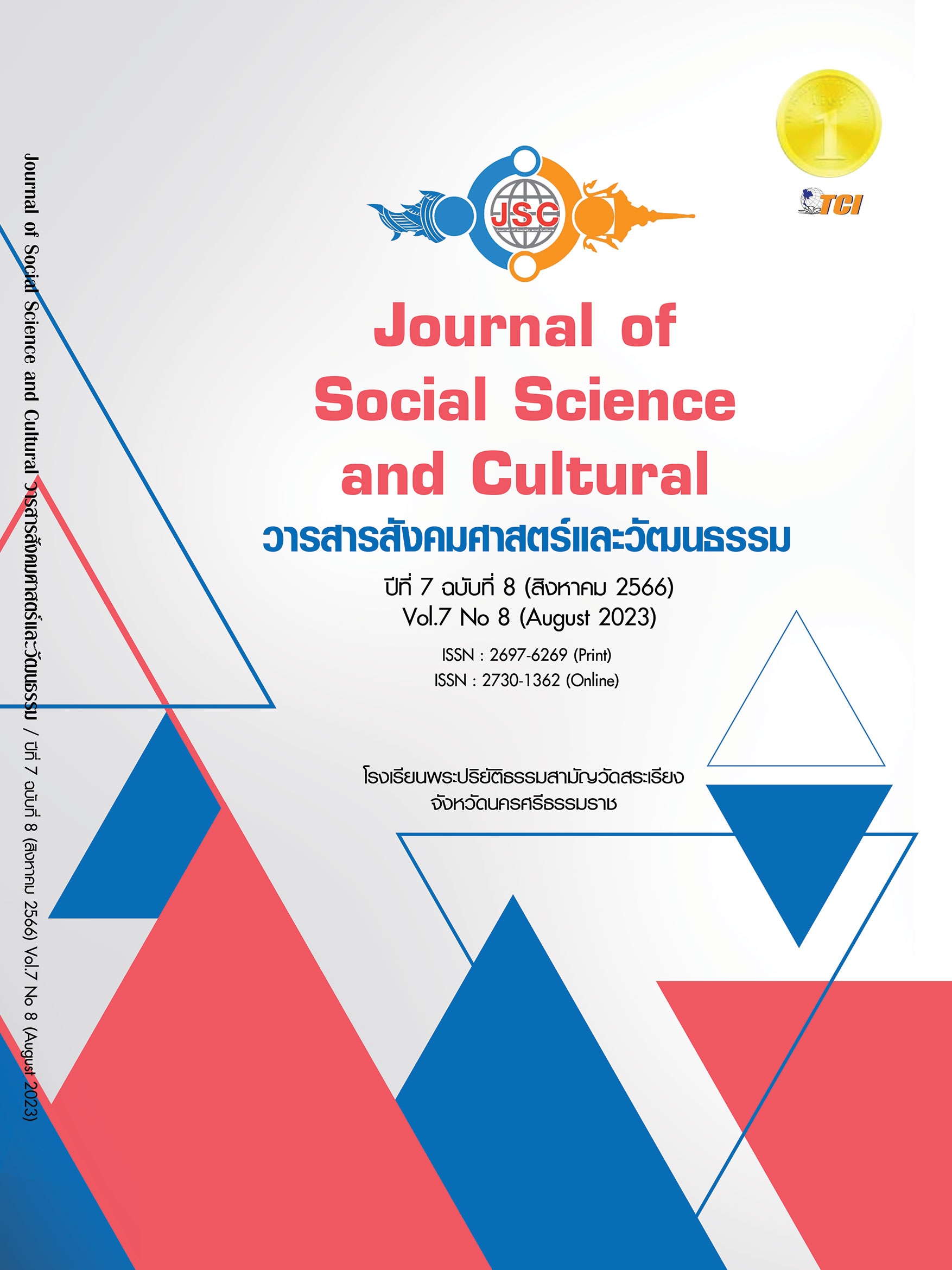THE DEVELOPMENT OF ADMINISTRATIVE COMPETENCY MODEL TO SERVE THE BEST PRACTICE ORGANIZATION OF MUNICIPALITIES IN THE NORTHEASTERN REGION, THAILAND
Main Article Content
Abstract
This research article aims to 1) study the administrative competency, 2) select the administrative competency, and 3) to create a model and guidelines for enhancing the administrative competency to serve the best practice organization as mentioned. This research is mixed-method research. The sample group was 502 municipal officials working in the Northeastern region. The research tools were questionnaires, interview forms, model assessment forms, and guidelines for building high-performance organizations. The statistics used in the research were percentage, mean, standard deviation. Confirmatory component analysis and tests for normal and ladder multiple regression analysis. The research findings were as follows: 1) The administrative competency factors and indicators for prediction to serve the best practice organization of Municipalities in The Northeastern Region, Thailand consist of seven factors: 1.1) Human resource management. 1.2) Network management. 1.3) Organization-wide quality management. 1.4) Performance-based management. 1.5) Social Capital Management. 1.6) Kaizen Management and 1.7) Horenzo Management. 2) The factors for selection of management administrative competency to serve the best practice organization of Municipalities could be categorized in four categories based on high to low values, namely, Kaizen management, performance-oriented management, organization-wide quality management and network management. 3) A model and approaches constructed for enhancing the administrative competency to serve the best practice organization cononsist of three parts: 3.1) Input factors consisting of Kaizen management, 3.2) Process factors consisting of PDCA model integrated with the four principles of Sangahavatthu in Buddhism and 3.3) Output factors, i.e. high performance organizations and the guidelines for enhancing the organization to produce high performances.
Article Details
References
เพ็ญศรี ลี้สุวรรณกุล. (2560). การพัฒนาองค์กรให้มีสมรรถนะสูง: กรณีสำนักงานพระพุทธศาสนาจังหวัดเพชรบุรี. กรุงเทพมหานคร: วิทยาลัยนวัตกรรมการจัดการ มหาวิทยาลัยเทคโนโลยีราชมงคลรัตนโกสินทร์.
เสน่ห์ จุ้ยโต. (2558). การพัฒนาขีดความสามารถบุคลากรขององค์กรปกครองส่วนท้องถิ่น. นนทบุรี: มหาวิทยาลัยสุโขทัยธรรมาธิราช.
จิราภรณ์ ผันสว่าง. (2562). ผู้นำกับการเป็นนักบริหารการศึกษามืออาชีพ. มหาสารคาม: โรงพิมพ์มหาวิทยาลัยราชภัฏมหาสารคาม.
ทิพวรรณ หล่อสุวรรณรัตน์. (2561). องค์การสมรรถนะสูงกับความรับผิดชอบต่อสังคม. วารสารการจัดการภาครัฐและเอกชน, 15(2), 11-36.
ธีระ รุญเจริญ. (2553). ความเป็นมืออาชีพในการจัดและบริหารการศึกษายุคปฏิรูปการศึกษาเพื่อปฏิรูปรอบ 2 และประเมินภายนอกรอบสาม. กรุงเทพมหานคร: ข้าวฟ่าง.
ประเวศ วะสี. (2541). ยุทธศาสตร์ชาติ เพื่อความเข้มแข็งทางเศรษฐกิจสังคมและศีลธรรม. กรุงเทพมหานคร: หมอชาวบ้าน.
พนิดา หวานเพ็ชร. (2555). กำรเพิ่มประสิทธิภาพการทำงานโดยใช้แนวคิดไคเซ็น: กรณีศึกษา แผนกบัญชีค่าใช้จ่าย. ใน วิทยานิพนธ์บริหารธุรกิจมหาบัณฑิต สาขาวิชาการจัดการวิศวกรรมธุรกิจ. มหาวิทยาลัยเทคโนโลยีราชมงคงธัญบุรี.
พิชยา เจริญสุกใส และคณะ. (2566). การบริหารจัดการองค์กรปกครองส่วนท้องถิ่นสู่การเป็นองค์การสมรรถนะสูง. วารสาร Lawarath Social E-Journal, 5(1), 193-208.
ศักดิ์ดา แดงเถิน. (2555). การบริหารงานโรงเรียนให้ใช้หลักการบริหารแบบมุ่งผลสัมฤทธิ์ของผู้บริหารโรงเรียน สำนักงานเขตภาษีเจริญ สังกัดกรุงเทพมหานคร. ใน วิทยานิพนธ์หลักสูตรครุศาสตรมหาบัณฑิต สาขาวิชาการบริหารการศึกษา. มหาวิทยาลัยราชภัฏธนบุรี.
สำนักงานคณะกรรมการการพัฒนาระบบราชการ. (2556). แนวทางการบริหารหลักสูตร. กรุงเทพมหานคร: โรงพิมพ์สหกรณ์การเกษตรแห่งประเทศไทย.
สำราญ มีแจ้ง. (2557). สถิติขั้นสูงสำหรับการวิจัยทฤษฎีและปฏิบัติ. กรุงเทพมหานคร: สำนักพิมพ์แห่งจุฬาลงกรณ์มหาวิทยาลัย.
Cohen, J.M., & Uphoff, N.T. (1980). Participations Phase in Rural Development: Seeking Charity Through Specificity. New York: World Developments.
Comrey, A. L., & Lee, H. B. (1992). A First Course in Factor Analysis. (2nd ed.). Hillsdale, NJ: Lawrence Erlbaum.
Cummings, T.G. & Worley, C. G. (2010). Organization Development and Change. New York: World Developments.
Oskland, J. S. (1993). Total Quality Management. New York: Heinemann, Oxford.
Wheatly, B. (1999). Leadership and the New Science: Discovering Order in a Chaotic World. (2nd ed.). San Francisco: Berret-Koehler Publishers.
Williams, R.L. (1994). Essentials of Total Quality Management. New York: American Management Association.


